The Intel 9th Gen Review: Core i9-9900K, Core i7-9700K and Core i5-9600K Tested
by Ian Cutress on October 19, 2018 9:00 AM EST- Posted in
- CPUs
- Intel
- Coffee Lake
- 14++
- Core 9th Gen
- Core-S
- i9-9900K
- i7-9700K
- i5-9600K
CPU Performance: Office Tests
The Office test suite is designed to focus around more industry standard tests that focus on office workflows, system meetings, some synthetics, but we also bundle compiler performance in with this section. For users that have to evaluate hardware in general, these are usually the benchmarks that most consider.
All of our benchmark results can also be found in our benchmark engine, Bench.
PCMark 10: Industry Standard System Profiler
Futuremark, now known as UL, has developed benchmarks that have become industry standards for around two decades. The latest complete system test suite is PCMark 10, upgrading over PCMark 8 with updated tests and more OpenCL invested into use cases such as video streaming.
PCMark splits its scores into about 14 different areas, including application startup, web, spreadsheets, photo editing, rendering, video conferencing, and physics. We post all of these numbers in our benchmark database, Bench, however the key metric for the review is the overall score.
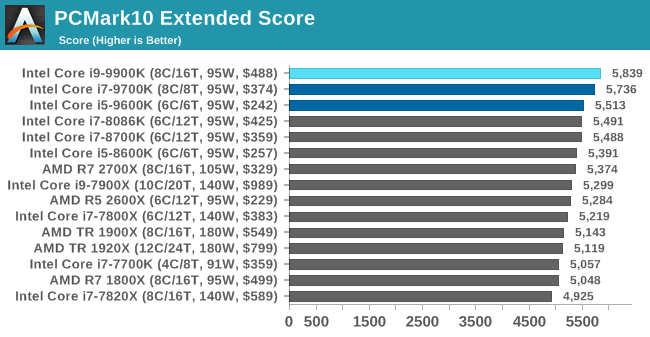
As a general mix of a lot of tests, the new processors from Intel take the top three spots, in order. Even the i5-9600K goes ahead of the i7-8086K.
Chromium Compile: Windows VC++ Compile of Chrome 56
A large number of AnandTech readers are software engineers, looking at how the hardware they use performs. While compiling a Linux kernel is ‘standard’ for the reviewers who often compile, our test is a little more varied – we are using the windows instructions to compile Chrome, specifically a Chrome 56 build from March 2017, as that was when we built the test. Google quite handily gives instructions on how to compile with Windows, along with a 400k file download for the repo.
In our test, using Google’s instructions, we use the MSVC compiler and ninja developer tools to manage the compile. As you may expect, the benchmark is variably threaded, with a mix of DRAM requirements that benefit from faster caches. Data procured in our test is the time taken for the compile, which we convert into compiles per day.
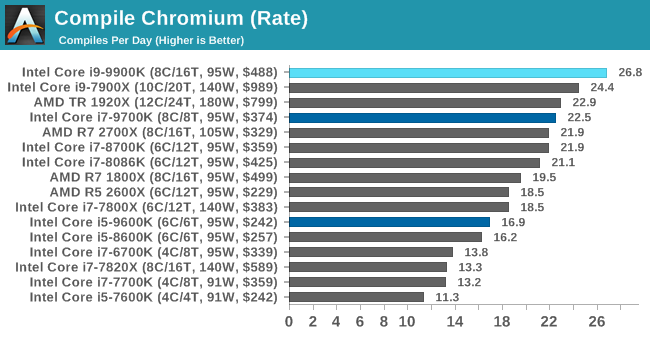
Pushing the raw frequency of the all-core turbo seems to work well in our compile test.
3DMark Physics: In-Game Physics Compute
Alongside PCMark is 3DMark, Futuremark’s (UL’s) gaming test suite. Each gaming tests consists of one or two GPU heavy scenes, along with a physics test that is indicative of when the test was written and the platform it is aimed at. The main overriding tests, in order of complexity, are Ice Storm, Cloud Gate, Sky Diver, Fire Strike, and Time Spy.
Some of the subtests offer variants, such as Ice Storm Unlimited, which is aimed at mobile platforms with an off-screen rendering, or Fire Strike Ultra which is aimed at high-end 4K systems with lots of the added features turned on. Time Spy also currently has an AVX-512 mode (which we may be using in the future).
For our tests, we report in Bench the results from every physics test, but for the sake of the review we keep it to the most demanding of each scene: Ice Storm Unlimited, Cloud Gate, Sky Diver, Fire Strike Ultra, and Time Spy.
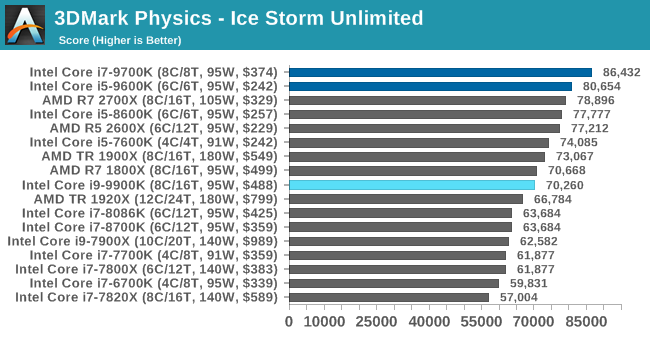
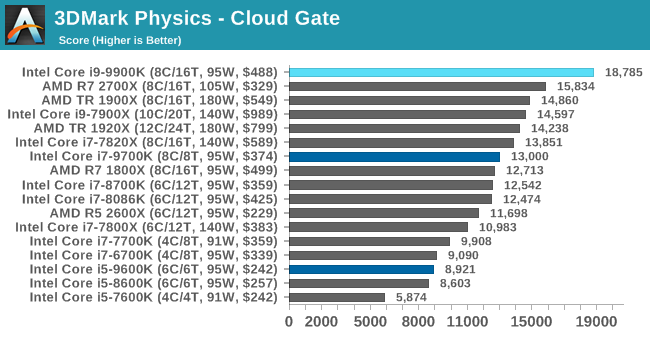
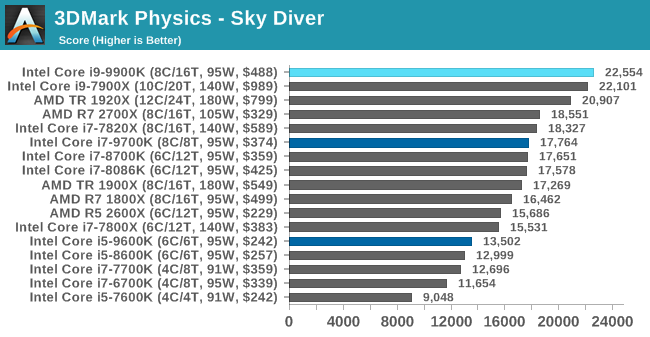
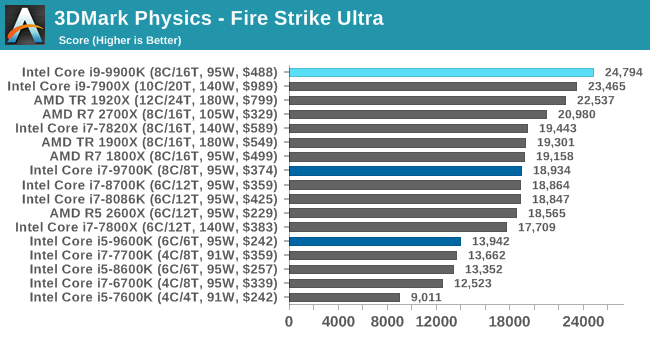
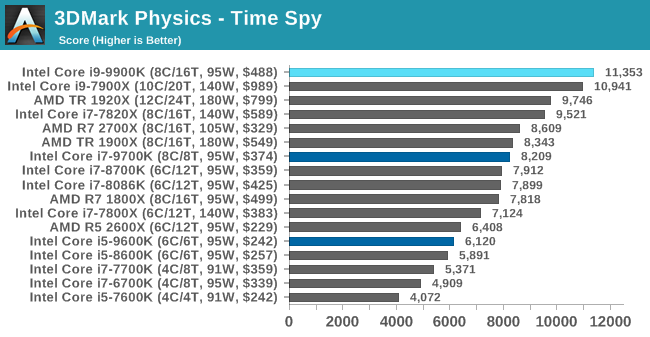
The older Ice Storm test didn't much like the Core i9-9900K, pushing it back behind the R7 1800X. For the more modern tests focused on PCs, the 9900K wins out. The lack of HT is hurting the other two parts.
GeekBench4: Synthetics
A common tool for cross-platform testing between mobile, PC, and Mac, GeekBench 4 is an ultimate exercise in synthetic testing across a range of algorithms looking for peak throughput. Tests include encryption, compression, fast Fourier transform, memory operations, n-body physics, matrix operations, histogram manipulation, and HTML parsing.
I’m including this test due to popular demand, although the results do come across as overly synthetic, and a lot of users often put a lot of weight behind the test due to the fact that it is compiled across different platforms (although with different compilers).
We record the main subtest scores (Crypto, Integer, Floating Point, Memory) in our benchmark database, but for the review we post the overall single and multi-threaded results.
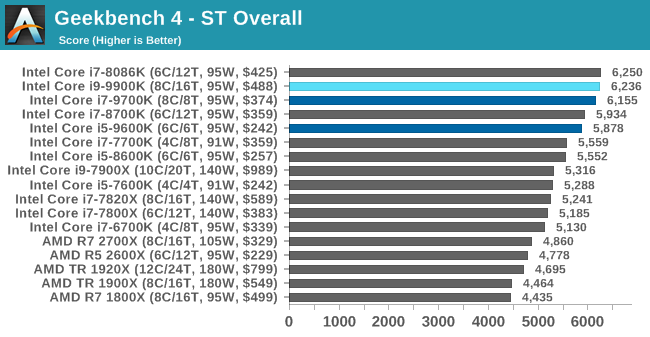
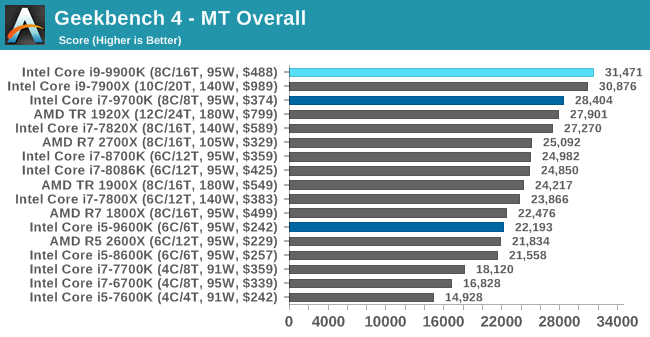










274 Comments
View All Comments
SanX - Thursday, October 25, 2018 - link
How come i7-7800x outperforms i9-9900 by the killing factor of 3-4 in particle movement? Is it not as "hand tunable" as older gen chips?davidk3501 - Thursday, October 25, 2018 - link
This is an overclockable processor, allowing users to push the frequency if the cooling is sufficient, and despite the memory controller still rated at DDR4-2666, higher speed memory should work in almost every chip. The Core i9-9900K also gets a fully-enabled cache, with 2 MB available per core for a chip-wide total of 16 MBashlord - Thursday, October 25, 2018 - link
My son's 4690K just blew up at such a shitty time. 8th gen 8400 is a decent replacement but 9th gen is out, so I don't really want to buy a previous gen item. I am guessing the '9400' will be out in a month or two. Going the AMD route has its issues too. It seems that AMD processors still have some issues with virtual appliances built using an older kernel. And in the past 30 years of computer ownership, I have never upgraded the processor. Components like motherboard or ram usually fail way before the CPU goes poof.In my country, R5 2600 w/Gigabyte Aorus B450M, 16GB of TridentZ RGB and a Cryorig M9+ goes for S$751. 8400 with MSI H310M Pro-M2, G.Skill Ripjaws V2400 and the same cooler goes for S$710.
ARgh!!! Don't know what to choose! Or maybe I should just give him my 6700K and get myself a new shiny toy.
nukunukoo - Friday, October 26, 2018 - link
I'm glad competition from AMD is back. Just a little over three years ago, an 8-core Intel would be a Xeon costing an arm and a leg!Dragonrider - Monday, October 29, 2018 - link
Just a note re the IGP. If you are going to try to watch 4k Blu-ray on your computer, you NEED that Intel IGP. I don't think there is any other solution to the DRM. For some, that alone would be a reason to get the Intel processor, all else being in the same ballpark.y2k1 - Wednesday, October 31, 2018 - link
What about performance pet watt? Is it basically the same as last gen?hanselltc - Thursday, November 1, 2018 - link
wat bout 9700k vs 9900k in gaming thoAlways_winter - Wednesday, November 28, 2018 - link
what cpu cooler did you usepoohbear - Monday, December 10, 2018 - link
Wow that 10nm CPU is taking forever eh? AMD is to release 7nm CPUs next month, and intel can't produce 10nm in 2019? What happened exactly?ROGnation7 - Saturday, February 23, 2019 - link
Watching all these benchmarks nowadays and taking count on how well optimised games are these days , at last the AAA titles , makes you think if it even worth it to spend more than 300-350 bucks on CPUs for gaming . Just look at i5-9600k and r5 2600x going toe to toe with high end CPUs with a decent graphics card.